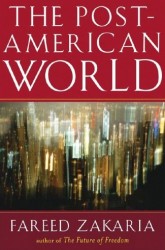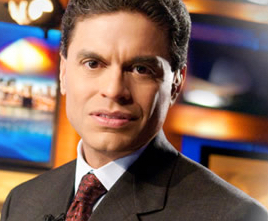The Second Troubling Case of Fareed Zakaria
 Almost exactly two years ago, prominent journalist Fareed Zakaria faced allegations of plagiarism.
Almost exactly two years ago, prominent journalist Fareed Zakaria faced allegations of plagiarism.
The case was pretty straightforward. Zakaria was accused of plagiarizing a paragraph in a column he wrote for Time Magazine from a similar essay written by Jill Lepore that appeared in The New Yorker months earlier.
Zakaria apologized and Time Magazine, the Washington Post and CNN, where Zakaria is a prominent figure, suspended him pending an investigation. However, a week later he was reinstated at both as, according to CNN and Time, the investigation failed to find any further missteps or mistakes.
However, now a new set of allegations have surfaced and those allegations call into question the effectiveness of that earlier investigation.
So which is it: Is Fareed Zakaria a rabid plagiarist who got off easy two years ago? Were Time, Washington Post and CNN sloppy with their investigations? Or are there other forces at play?
To find out we have to take a look at the exact allegations and what they likely mean.
The New Allegations
 The allegations come from @blippoblappo and @crushingbort, two anonymous Twitter users who were also responsible for the allegations that brought down Buzzfeed editor Benny Johnson.
The allegations come from @blippoblappo and @crushingbort, two anonymous Twitter users who were also responsible for the allegations that brought down Buzzfeed editor Benny Johnson.
In a pair of blog posts, the duo drew attention to what they saw was several instances of Zakaria using material from other sources without proper attribution.
In their first blog post, they analyzed 12 instances of alleged copying. All of Zakaria’s articles in the first post were published before the 2012 plagiarism allegations came to light. They range from July 2011 to June 2012, less than a month before the plagiarism investigation was to take place.
The second post takes a look at Zakaria’s book, The Post-American World and finds a series of passages in it that the authors say was copied from outside sources including two works by Fawas Gerges and several works from Karl Meyer.
Zakaria, for his part, fired back at the allegations, saying in an email to POLITICO of the first post that, “These are all facts, not someone else’s writing or opinions or expressions.”
Both the Washington Post and CNN released statements defending Zakaria, both of which cite the original scandal in 2012 and their investigation of his earlier work.
So who is right in this? The answer, as usual, lies somewhere in the middle.
Analyzing the Allegations
Looking at the first article, I immediately have issues with the way that the information is presented.
All of the matching content is highlighted in yellow, both in the source and in the original. Traditionally, this is used to indicate verbatim matching of content however, when you read the examples closely, that is often not the case. This makes the allegations appear MUCH more severe than they actually are.
For example, in the second instance, the authors use heavy yellow highligthing but are only pointing to examples that are the same between Zakaria’s column and an earlier work. No actual text is copied. Still, someone just scrolling through the article might get the impression Zakaria had copied over a paragraph’s worth of content without attribution when that is not the allegation.
In fact, as Zakaria said, most of the allegations hinge upon the copying of facts and not actual expression. Examples where there is matching text are usually limited to just a few words, as with example 12 with its 11-word sentence, which would have been difficult to rewrite and maintain a tone and language proper for a journalist.
For me, the second article, the one that focuses on Zakaria’s book, is much more interesting. Here, the highlighting is used correctly and it does show several passages of the books that do clearly have a problem.
The first example alone has several paragraphs of duplicate content lifted from two works by Fawas Gerges, his 2009 book The Far Enemy and a 2007 column for the Christian Science Monitor. According to the blog’s authors, much of the repurposed text also appears in a 2010 Newsweek column by Zakaria. Even more disturbing, Gerges is not cited anywhere in the footnotes of the book.
The second set of examples focuses on shorter passages with greater rewriting, however, it too raises several instances where content appears to have been copied verbatim without clear attribution.
So while the first post only presented scenarios that were gray area at most, the second does raise serious questions about his book. Hopefully his publisher, W.W. Norton, will look into these issues and work to detect any other problems.
Answering the Tough Questions
With all of that being said, there are a series of tough questions that people are asking about Zakaria and I’ll do my best to answer them below:
1. How Did CNN/Time/Washington Post Miss These?
Most of the new allegations involving these publications center around facts, not verbatim copying of content. Though @blippoblappo & @crushingbort highlight the works in such a way that they appear to contain large amounts of copied text, the truth, on closer examination, is that very little was copied verbatim.
Since Zakaria’s initial scandal involved a lifted paragraph verbatim, it makes sense that his publishers would have been looking for more of the same. Furthermore, verbatim copying is the kind of copying that’s easiest to detect with modern technology and, since the investigation only took a week, it probably was about all they had time for.
To make matters more complicated, the questions about when, how and to whom you attribute facts is a difficult one, especially in journalism. Just as a teacher will usually instruct students that there is no need to cite facts that are “common knowledge”, journalists also wrestle with when to cite facts in their work.
So, even if CNN and others did find these instances, they might, legitimately, argue that they didn’t need citation, which is exactly what they are arguing now.
2. Is Fareed Zakaria a Plagiarist?
There is no easy answer to this question. Plagiarism is a wide-ranging set of offenses that has a broad spectrum of types and severities. So the point when one crosses the line to be a plagiarist is a dubious one at best.
There is no doubt that Zakaria plagiarized the paragraph in 2012, even he admits that. There are also potential issues with his book. However, the other examples are gray area at most as to whether or not they are plagiarism at all.
Clearly, more investigation is needed, first and foremost by his book publisher but also by his other publications.
Whether he is a plagiarist or just simply someone who had made a handful of errors in an enormous body of work is still up in the air. If other allegations stick, the case could go like Jonah Lehrer, if they don’t, it could go exactly like his first scandal. Nowhere.
Right now, I don’t feel as if all of the facts are in and one area I do agree with the original authors is the need for further investigation.
3. What Role Does Politics Play?
Currently, we don’t know the politics of @blippoblappo and @crushingbort or if they played a role at all. Many of the allegations seem to be thrown at CNN, Time and the Washington Post rather than Zakaria himself.
Politics played a major role in the first scandal because Newsbusters, the organization that first went public with the allegations, is a conservative online site that promotes itself as combatting liberal media bias. Zakaria is a well-known liberal commentator.
So while politics may have played a role in the latest round, right now we just don’t know.
Bottom Line
In the end, the use of poor highlighting, whether intentional or accidental, seems to give the impression that the scandal is far worse than it is. One quickly scrolling through the article, as many will inevitably do, will get the impression that Zakaria lifted paragraphs of text when that isn’t the case, at least not in the first post.
Still, Zakaria doesn’t get a pass here, at least not from me. The issues with his book are much more clear and need to be addressed by his publisher. Furthermore, the rest of the allegations against Zakaria are an opportunity to have a conversation about when and how facts should be attributed.
Obviously, I would prefer if Zakaria, and every other journalist, cited all of the sources for their facts. However, for decades, if not centuries, authors have been told that, in many situations, it isn’t necessary.
As far as what to do with Zakaria, I would like to wait for all of the facts and a further investigation by his publisher. If this is all there is, then the book should be corrected immediately but further action is probably impractical. If Jane Goodall can commit more severe plagiarism over the course of her work and only have the book held back for correction, it’s unlikely Zakaria will face anything more severe.
While that may not be right, especially considering the slew of hard working authors hungry for the chance at what Zakaria already has, it’s the reality we live in.
All in all, unless new revelations come to light, Zakaria will survive this scandal, most likely with even less trouble than the first. While much of that is because some of the allegations don’t stand up to close scrutiny, it’s also because of who Zakaria is and his popularity.
Want to Reuse or Republish this Content?
If you want to feature this article in your site, classroom or elsewhere, just let us know! We usually grant permission within 24 hours.
